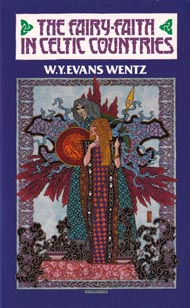The Fairy-Faith in Celtic Countries
W.Y. Evans-Wentz
Oxford University Press 1911, Colin Smythe Limited 1977, reprint 1999
First published in 1911, The Fairy-Faith in Celtic Countries by W.Y. Evans Wentz has become a classic
on the subject, even though it is less well-known than, for example, his Tibetan Book of the Dead,
Tibetan Yoga and Secret Doctrines, and The Tibetan Book of the Great Liberation.
This had been largely due to its having been out of print for so long: the publication of this paperback
edition was therefore extremely timely.
The Fairy-Faith is the author's first book, and is dedicated to two people who had greatly influenced him:
the poet William Butler Yeats, and George William Russell - 'A.E.' - perhaps the West's greatest mystic and
visionary this century, and is the anonymous mystic whose interview is printed on pages 59-66 of this book.
The theme of The Fairy-Faith, as Dr Kathleen Raine, the poet and Blake and Yeats scholar, has succinctly
written in her foreword to this edition, is 'the-other-world of the Celtic race as this can be discovered in the
fairy-lore common to all the Celtic countries - Ireland, Scotland, Wales, Brittanty, Cornwall and the Isle of Man...
In their beliefs and traditions about the fairy-world the Celts have retained elements of their pre-Christian
religion.' In those places, 'furthest removed from the influence of modern civilisation, the oral tradition
of unlettered country people has preserved elements of the religion of a learned caste, the Druids, whom
Pythagoras himself honoured as custodians of secret knowledge. Elements of earlier and later faiths and local
circumstances have coloured this immemorial doctrine of the unseen world only superficially... the old
religion is grounded in the unchanging nature of things visible and invi-sible common to all traditions...
the universe is held to be living. The visible is but the outher aspect of the one life, diversified into
spiritual beings, energies and agencies of all kinds.'
(Bovenstaande tekst komt van het voorwoord van het boek)

